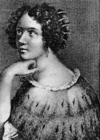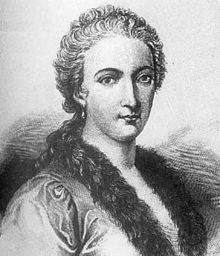1. The first was Hypatia of Alexandria (370-415). She was a Greek philosopher, astronomer, and mathematician. In the year 440 she became head of the Neoplatonic School in Alexandria, Egypt. Hypatia learned mathematics from her father,a teacher in mathematics, and later by many others. Although none of her written work as survived, she has a commentary on the 13-volume of Arithmetica by Diophantus, commentary on the Conics of Apollonius, edited the existing version of Ptolemy's Almagest, edited her father's commentary on Euclid's Elements, and wrote a text called "The Astronomical Canon".

2. Elena Cornaro Piscopia (1646-1684) was an Italian mathematician, philosopher, and theologian. Piscopia was a child prodigy who became the first woman to earn a doctoral degree. She got her degree at the University of Padua in theology and later became a lecturer there in mathematics. She was the first and last woman to receive her doctoral degree from the University of Padua until the late twentieth century. She also studied many languages including Hebrew, Spanish, French, and Arabic, composed music, sang, and played many instruments.

3.Maria Agnesi (1718-1799) was an Italian mathematician, philosopher, and philanthropist who was the oldest of 21 children and was considered to be a child prodigy. She wrote a textbook for her brothers, explaining mathematics which later became the first mathematics book by a woman that still survives today. The first volume of her book covered arithmetic, algebra, trigonometry, analytic geometry, and calculus. The second volume covered infinite series and differential equations. No one before her had published a text on calculus that included the methods of calculus of both Isaac Newton and Gottfried Liebnitz. She became the first woman appointed as a mathematics professor at a university, the University of Bologna, which was an act on Pope Benedict XIV. Agnesi also was recognized by the Habsburg Empress Maria Theresa of Austria.

These women faced discrimination and oppression yet overcame all obstacles to dive into the depths of mathematics. They were all brilliant and very brave for having been involved in the field of mathematics which was overwhelming dominated by males. If it hadn't been for these women and others before and after them, women may have never had the courage to stand up to men and expand their knowledge in the mathematics field. Because of these women I was able to study mathematics without even considering it being a big deal. But for these women it was and I can't imagine the suppression they endured based on gender alone. In 2010, women earned 57.2% of bachelor degrees in all fields, 50.3% being in the sciences and engineering fields. This is a huge accomplishment for women and without the many brave women before us, this dream may never have been a reality.
References:
http://scholarship.claremont.edu/cgi/viewcontent.cgi?article=1154&context=cmc_theses
http://womenshistory.about.com/od/sciencemath1/tp/aatpmathwomen.htm
http://www.ngcproject.org/statistics
Good post. Never heard of Piscopia before. Love to know more about her mathematics. Well consolidated, especially. 5Cs +
ReplyDelete